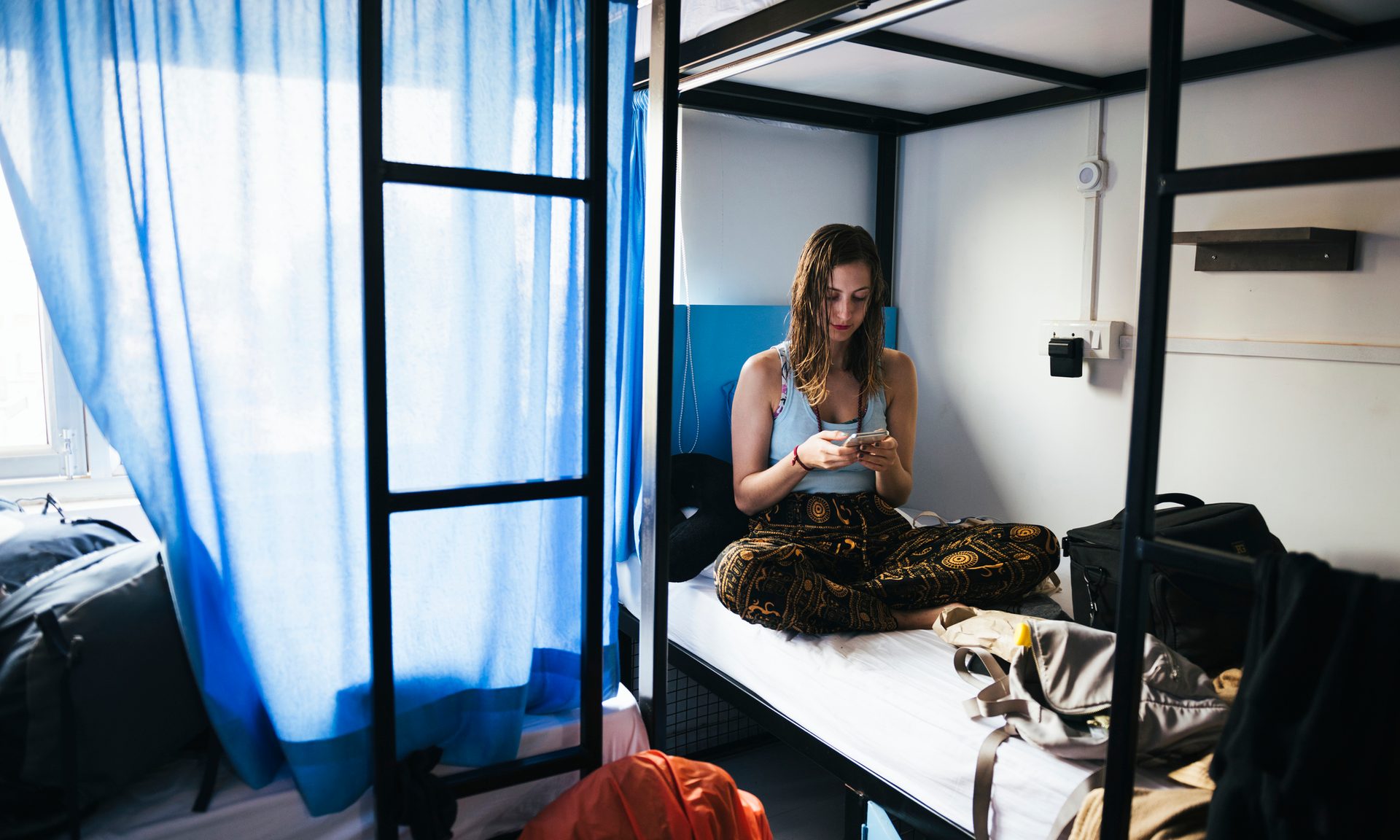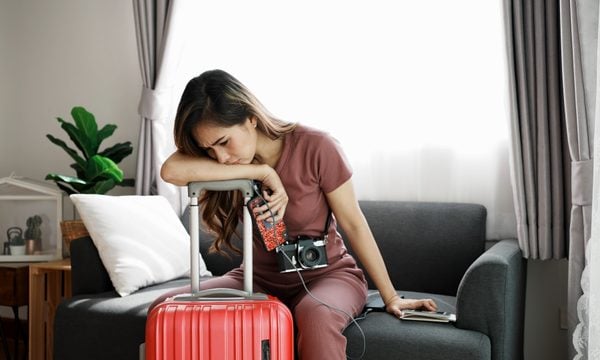5 Hostel Safety Tips
Don’t leave your things unattended and bring a padlock to secure your belongings while staying in a shared space.

Many or all of the products on this page are from partners who compensate us when you click to or take an action on their website, but this does not influence our evaluations or ratings. Our opinions are our own.
Booking a room or bed space in accommodations that include shared community spaces can be a great way not only to save money while traveling, but also meet like-minded travelers. To save even more money, you might consider staying in a hostel dorm, where you share both sleeping space and community space.
Are hostels safe? According to a 2020 survey by Hostelworld, an online travel agency specializing in hostels, 53% of respondents opted for a shared room over a private room. Nearly three-quarters of the bookings made on Hostelworld are for dorm-style accommodations. This indicates that many travelers find shared lodging to be a safe-enough option for their trips.
Hostels have several upsides, but it’s important that you feel safe in these situations, too. Here are some hostel safety tips you can follow to make sure your trip is fun and incident-free.
Get the 'Cheat Codes' to Cheaper Travel
Unlocking the secret to saving a ton on travel is easier than you think. 📤 Our free newsletter shows you how in 5 min. or less.

1. Choose a room that locks
If you’re going to rent a private room at a vacation rental, look for a room that has a lock on the door. This way, when you leave your room, you can feel confident that other guests won't have access to your belongings.
Some short-term rental websites share this information ahead of booking so you can make the safest decision possible. For instance, on Airbnb, you can navigate to the “Home safety” section of a listing to see if it includes the detail: “Lock on bedroom door. Private room can be locked for safety and privacy.”
If you don’t see anything mentioned, read through the reviews or reach out to the owner to ask before you book.
Consider also asking the host who has access to the apartment and/or building.
- Do all guests get a set of keys for the building entrance and front door?
- If the building or apartment has access via a secure code, who has access to the code?
- Can past guests, for example, access the property?
» Learn more: 8 safety tips for solo female travel
2. Carry a padlock for your luggage when staying in a hostel dorm
When you plan to stay in a hostel dorm, pack at least two padlocks: one for your luggage itself and one for the personal locker that you’ll ideally have access to.
Hostels come in different shapes and sizes. Some have dorms with lockers large enough to fit your entire suitcase. For example, when I stayed in a dorm at the Selina hostel in Lisbon, Portugal, I had access to three lockers: one under my bed, one above my bed and a small personal one.
However, some hostels don’t offer lockers for travelers, and even worse, sometimes the entry to group rooms may be unsecured. When I was traveling in Bariloche, Argentina, I stayed in an old hostel with both of these realities. This wasn’t an ideal scenario, but thankfully, I had a padlock for my luggage. I was still able to keep my belongings semi-secure and, luckily, didn’t have any issues.
» Learn more: 5 tired travel myths — put to bed
3. Don’t leave your stuff unattended
If you’re staying in a shared space, try not to leave your things unattended or outside of a secure locker, even if it's just in your room. In a hostel dorm, if you leave your purse, phone, passport or laptop in the room while you’re not there, you’re taking a risk.
If something is stolen, it may be difficult to figure out who took it; the culprit could be a departing guest, someone who's visiting another guest, etc. It’s better to avoid this scenario altogether by never leaving your belongings unattended or unsecured.
» Learn more: A beginner's guide to budget travel
4. Leave your valuables at home
According to a 2019 survey by insurer Jewelers Mutual Group, 20% of people have had their jewelry lost or stolen while traveling, and only 1% ever recover their jewelry. This is an unfortunate position to be in and can definitely ruin your trip.
When on vacation, you’re better off not packing your valuables at all — especially if you’re staying in a hostel dorm or room in a group short-term rental. The last thing you want to worry about while on vacation is having an expensive watch or purse get stolen and filing an insurance claim.
If you like wearing fine jewelry, purchase some costume jewelry or a cheaper alternative ahead of your trip. Or better yet, purchase something local at your destination — you’ll look good and have a new piece of jewelry with a memory attached.
5. Get travel insurance so your belongings are covered
Speaking of theft, there are additional steps you can take to protect your belongings while traveling. Before you leave, consider purchasing a travel insurance policy. Many credit cards provide complimentary trip insurance, so if you have a travel card, find out if these perks are included.
Travel insurance policies include a baggage and personal items loss benefit, which provides reimbursement for lost, stolen or damaged luggage. Look for policies that cover your belongings on the entire trip, as some policies may cover only your luggage while you’re traveling with the common carrier (that is, flight, bus, train, etc.).
Often, the baggage and personal items loss benefit will have a total item limit, a per-item limit and a specific item limit. Check the list of exclusions in the policy fine print so that you’re aware of what is and isn’t covered.
» Learn more: The best travel credit cards right now
Staying in a hostel dorm or room in a short-term vacation rental is an easy way to save money while traveling. If you’re staying in a hostel dorm, bring two padlocks so you can secure your belongings. If a vacation rental is your preference, search for bedrooms that have locks on them.
Don’t leave your things unattended or unsecured when you’re not in the room and avoid traveling with valuables to avoid being the victim of theft. If you're concerned about theft of any of your items, even less valuable ones, travel insurance can help give you peace of mind.
Article sources
NerdWallet writers are subject matter authorities who use primary,
trustworthy sources to inform their work, including peer-reviewed
studies, government websites, academic research and interviews with
industry experts. All content is fact-checked for accuracy, timeliness
and relevance. You can learn more about NerdWallet's high
standards for journalism by reading our
editorial guidelines.
Limited Time Only: Earn $1,000 Toward Travel!
Capital One Venture Rewards Credit Card 
Travel

For a limited time, the
Capital One Venture Rewards Credit Card is offering new cardholders an especially rich bonus: Enjoy $250 to use on Capital One Travel in your first cardholder year, plus earn 75,000 bonus miles once you spend $4,000 on purchases within the first 3 months from account opening - that’s equal to $1,000 in travel!
More like this
Related articles








